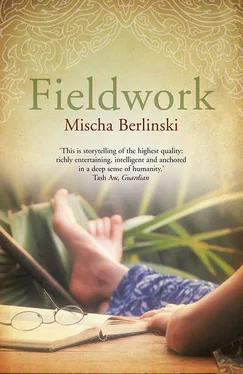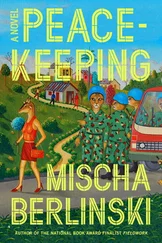other year teaching the first grade. The children at the school were no less susceptible than the adults to the weather, and Rachel came home drained, with stories about breaking up fights and cruel teasing and tears. There were Byzantine political intrigues among the elementary school teachers. The fourth-grade teacher would not talk to the fifth-grade teacher because the fifth-grade teacher refused to erase the chalkboard when her class was done. It was a point of pride.
I stopped sleeping well at night and had strange dreams, and I woke up in the morning unrefreshed, anxious and sweaty. But I took good naps. In the afternoon, after eating a bowl of noodles on the corner, I would stagger back to the house, focus the fan on the ceiling the better to diffuse its cooling waves across my clammy back, close my eyes, and then an hour would be lost, my pillow damp with drool. With the Walkers gone, Martiya's story stalled; my life felt purposeless and stale; days drained into weeks.
Itinerant peddlers pushed handcarts along our suburban streets or balanced long bamboo poles across their narrow shoulders, selling brooms and fans made from wild mountain grass, medicinal herbs, thin pancakes, splotchy speckled eggs roasted over a charcoal fire, lacquerware pots from Burma, tin locks and metal pans from China, and fruit— rose apples, lychees, pineapple, and mango. I woke up one late afternoon to the musical tinkle of the fruit man's bell. Only the thought of icy-cold pineapple got me out of bed. Wearing shorts and flip-flops, I stumbled out of the house as the evening wind, which was not cooling, picked up with its false promise of rain. The wind made the bamboo howl like mating cats and the palms sway, and pushed southward the huge clouds, which drifted along slowly overhead like the alien invasion fleet from Xylon IV.
My neighbor Baiyom had also scurried out of her cement hut to buy papaya and pineapple. "Hot it is!" Baiyom said sympathetically. She paid for her fruit and went home.
I bought my pineapple and stood outside on the lawn, spearing the pineapple with my wooden stick. This was always a risky business because the plastic bags punctured easily, and once punctured the delicious juice would be lost. Slimy pineapple goobers dripped down my chin. The light outside was turning purplish like an eggplant.
The phone rang inside the house. Thai telephones ring the way telephones ring in old movies, with an actual hammer striking an actual bell, and are very loud. I went inside to answer it. It was Karen Leon, who had not heard from me but had dreamed just the other night of Martiya and wanted to know if I was making any progress.
Nineteen eighty-three (Karen told me on the phone) — now, that was just one perfectly crummy year. It was the year in which Karen was denied tenure at the University of Pennsylvania and was finally divorced from Ted. She found herself a lectureship at the University of Wisconsin, and it began to snow in October. Her grant applications were denied, one after the other, all through the fall, and without a grant, how could she do fieldwork? If she couldn't do fieldwork, what would she publish? If she couldn't publish, how could she get the hell out of the Midwest?
Thirty-four was a lonely age: hardly a month passed now without seeing something in Ethnology or Man from one of her classmates at Berkeley; her ex-husband had been awarded tenure for a series of papers in theoretical anthropology that he had completed without ever leaving the library . The man, she knew very well, had an expired passport. The closest he had ever come to a primitive society was France . Theory! Don't get me started on theory. All anyone does these days is theory, and if you're not a theoretician , don't even bother to look for a job. Whatever happened to old-fashioned fieldwork? Learning languages?
Had she mentioned that the snow began to fall that year in November? She was getting these weird little lines around her eyes, no doubt from all that tropical sun absorbed while doing all that apparently useless fieldwork. Every morning Karen went to her office to sift once again through the field notes she had collected while preparing her dissertation, hoping to find some nugget so scintillating that, her nugget having been published in Anthropos , a university far, far to the south would call her; then the slow drive back home in her Ford Pinto with that bad smell of burning rubber, which meant that pretty soon she'd have to ask her parents for a loan, through the snow to her rented house with its formaldehyde kitchen floors and fake wood paneling. She was supposed to be an intellectual, but at night the only thing she felt the energy to do was watch Dynasty ; and she found herself speculating more often and with more honest curiosity on what was going to happen next to Alexis and Blake Carrington than on the sexual mores of the indigenous peoples of the southern Philippines. She was starting to consider law school.
But, Karen said, it had not always been like this. Not at all. Karen and Martiya had been roommates in graduate school, and although both professed a certain blasé world-weariness, the truth was, nobody had ever gone into the field more excited than they. They were both keenly aware that they were students of a student of the great Malinowski, and in their little apartment, directly on the wall of the kitchen — rental deposit be damned! — Karen had hand-lettered with a felt pen a quotation from Argonauts of the Western Pacific : "To grasp the native's point of view, his relation to life, to realize his vision of his world." That was what you were supposed to do. That's how innocent they were.
Karen and Martiya regularly held dinner parties in the little apartment on the north side of campus, dinner parties packed with a dozen anthropologists all chatting feverishly about this so-incredibly-cool thing that name-your-primitive-tribal-people did. Karen made spaghetti with clam sauce. Joseph Atkinson would sit cross-legged on the floor like some loquacious Buddha, his bald head gleaming; and just to tweak their professor, Karen and Martiya would often invite another professor from the department, Arthur Samuelson, to their parties as well. Samuelson always sat on a chair. Samuelson was a student of the great Radcliffe-Brown, Malinowski's longtime rival, and the rivalry had descended through the next scholarly generation. It was thrilling to watch Atkinson and Samuelson spar. Because of her upbringing, Martiya felt she had a tribe of her own to discuss, and she never hesitated to throw herself into the conversation; but Karen could only rely on the published work of others, and she stayed silent, longing for the day when she could speak authoritatively as the mistress of her own people. She hadn't worried in those days about tenure or publications, and indeed would have considered such things only status markers within the particular tribe of academic anthropologists. That's not why they were in this business. No, Karen and Martiya were convinced that when they finally got out into the field, it would be a liberation, a way to shed the scaly skin of self.
And it was.
Karen said that the field was just what she had hoped for. Karen was from such a small town in Texas that when she finally came home from the Philippines, they interviewed her for the local newspaper and asked her why she had wanted to go and live with a tribe of nomadic boat dwellers in the islands of the south Philippines. "You mean other than because it's incredibly fun?" Karen said, almost babbling. "I guess because it pays off for your psyche . It pays off for your psyche when you are able to tear down your own system of belief. You've got to undo your preconceptions about the world, about who you are, about yourself, about community, about everything . Because when you study a foreign tribe, you've got to leave your world behind, you have to be totally open and empty, which is — almost impossible. I mean, you're trying to get into another soul. But it is also a great deliverance. It's the best chance you can have to know who you are." Karen was quoting Joseph Atkinson, but she meant every word of it.
Читать дальше












